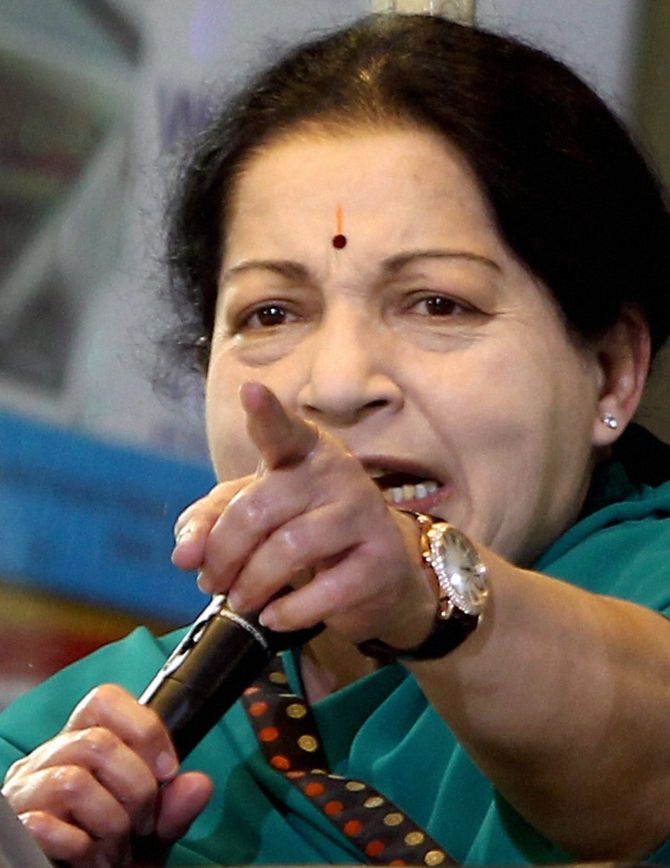 The moot point is if a re-energised Jayalalitha will order snap polls when the Opposition is in disarray and her own political starts are on the rise, says N Sathiya Moorthy.
The moot point is if a re-energised Jayalalitha will order snap polls when the Opposition is in disarray and her own political starts are on the rise, says N Sathiya Moorthy.
In a sensational verdict with far-reaching political consequences for neighbouring Tamil Nadu, Justice C R Kumarawamy of the Karnataka high court acquitted former TN chief minister Jayalalithaa of all charges in the ‘disproportionate assets case’. The court also acquitted her three co-accused.
The verdict has cleared the path for Jayalalithaa to return as chief minister for the fourth time, that too after a judicial clearance in corruption cases pertaining to her first term (1991-96). Barring her own personal preferences, and the fact that it’s the inauspicious Ashtami-Navami days under the Hindu calendar on Monday and Tuesday, Jaya may be back as chief minister any time now.
There is no question of her ‘replacement’ and All India Anna Dravida Munnetra Kazhagam treasurer, O Pannerselvam, quitting as chief minister a second time. Earlier, he had been made chief minister after the Supreme Court ‘disqualified’ her from holding the post after being sworn as a follow-up to the 2001 assembly polls. Jaya returned after the Supreme Court acquitted her in the equally testy ‘TANSI land deal case’, which has had a chequered legal and judicial career as the ‘wealth case’ now.
Even as the Opposition DMK, with its nonagenarian general secretary K Anbazhagan, should be licking its new wounds, after hopes of a cohesive party facing next year’s assembly polls with regained confidence following the twin poll drubbing in 2011 (assembly) and 2014 (Parliament), both at the hands of Jaya’s AIADMK, the question is if the latter would order snap polls when the Opposition is in disarray, and her own political stars are on the rise.
Jaya’s ardent fans and followers, who had not spared any temple or ritual to pray for her early return to power are both jubilant and re-energised. They hope that their long-held position of ‘political vindictiveness’ by the successor DMK government (1996-2001) has been vindicated, after all. To the extent that the DMK, Desiya Murpokku DK, Pattali Makkal Katchi and the rest of the anti-Jaya, anti-AIADMK political parties would be demoralised and disheartened even more, there is no knowing how they could bounce back in the poll game, particularly if one were to be held in the near future and without much break.
The question in such a situation would be if Jaya and the AIADMK would continue to remain as “caretaker government” if the state cabinet were to recommend the dissolution of the state assembly, to Governor K Rosaiah for facilitating early polls.
Precedents in the case of states have invariably been a term of President’s rule, as against a “caretaker government” at the Centre under the SC verdict in the UNR Rao vs Indira Gandhi case.
Even without that, back in power, Jaya may also want to take time putting the AIADMK government’s house in order before going back to the people for a possibly sweeping victory, in what could turn out to be an “unfought war” of a kind.
Jaya may also want to be showcase her state all over again to the international investor, by holding the twice-postponed ‘Global Investor Meet’, now as scheduled in September.
And on issues of state interest, including the Sri Lankan fishermen issue, Katchchativu case, and river water disputes with neighbouring Karnataka (Cauvery) and Kerala (Mullaperiyar), a rejuvenated Jaya could be expected to go hammer and tongs, in seeking to ‘protect’ the interests of Tamil Nadu more than already.
The state government may also begin taking a keener political interest and closer look at the Andhra police killing of 20 citizens from the state not very long ago. What essentially had been an unfortunate and at times dangerous episode of the killing of 20 citizens from the state has acquired the imagery of a ‘wanton killing of Tamils’, at the hands of peripheral groups in Tamil Nadu, since.
If she decides not to go in for early polls to the state assembly, Jaya would then have to contest a by-election and win it. In 2001, after the SC had acquitted her in the TANSI case, she waited for winning a by-election seat before returning as chief minister.
Will Jaya have to face an appeal against her acquittal, now before the Supreme Court? It’s too sensitive a political decision for the Congress-ruled Karnataka government. A three-judge bench of the Supreme Court has recently held that Karnataka, and not Tamil Nadu, alone has the right to agitate the appeals case (in the ‘Bhavani Singh SPP case’).
The bench, headed by Justice Dipak Misra, also cleared Anbazhagan to submit written submissions to the high court, thus implying that he could still be an interested party’ in the case.
Again, it would be a political decision for the DMK to take, as the AIADMK’s claims of ‘political vindictiveness’ on its part could have gained some judicial endorsement of a kind for the TN voter to consider.
However untiring as he has been, Subramanian Swamy, then heading his Janata Party-led ‘Good Governance Movement’ against the Jaya regime and now in the BJP, has said that he would go on in appeal, if none else did.
Like Anbazhagan, the court might want to first decide if either or both of them have the locus standi, to prefer the appeal in the first place.
Image: Tamil Nadu Chief Minister and AIADMK supremo J Jayalalithaa. Photograph: R Senthil Kumar/PTI Photo.
N Sathiya Moorthy, veteran journalist and political analyst, is director, Observer Research Foundation, Chennai chapter.











 © 2025
© 2025